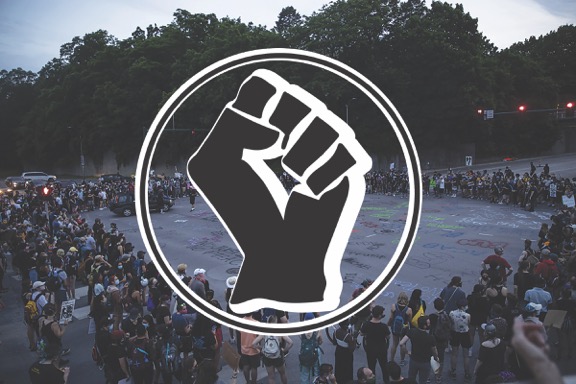Iowa City community leaders look back at how their activism has evolved over a year after Black Lives Matter protests
Over a year ago, the Black Lives Matter movement swept through Iowa City and empowered six community leaders to speak up against discrimination and expand their hopes for Iowa City.
October 19, 2021
Those who were in Iowa City during summer 2020 remember nights of chanting and marching.
Crowds that reached a peak of nearly 2,000 walked through the streets, bearing “Black Lives Matter” and “Stop Killing Us,” signs, among others.
After a violent video spread across the world, showing Minneapolis police officer Derek Chauvin kneeling on George Floyd’s neck for 9 minutes and 26 seconds — which killed Floyd and eventually resulted in a murder conviction for Chauvin — protests broke out across the nation, including in Iowa City.
Individuals came together from within the community and beyond to stand at the Pentacrest, the Johnson County Courthouse, and Iowa City City Hall, calling for systemic change from local government leaders and law enforcement officials, many calling for the full abolition of police.
That summer, a group of Black women mentally, emotionally, and physically exhausted from continuous violence against the Black community at the hands of police banded together to protest the death of Floyd and other Black victims of police brutality.
They created the Iowa Freedom Riders, an organization that led the call for changing policies and procedures at the city and county level, channeling grief into activism and attracting hundreds of members.
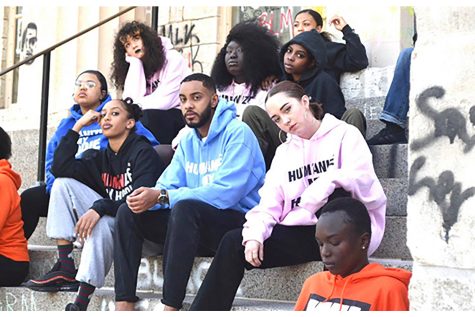
More than a year later, Iowa City has witnessed fewer protests, but the step forward was imprinted, paving the way for action and change put in place by community organizations and local government officials to address systemic racism.
Six leaders in the Iowa City community remember how their activism evolved over time, from before the protests to now almost a year and a half later. While their actions may have changed, their desire for a better Iowa City has not.
Ala Mohamed: “It could have been any of us in that moment.”
Ala Mohamed said protesting in Iowa City in summer 2020 and helping to found the Iowa Freedom Riders was “not the first rodeo” she or fellow Iowa Freedom Riders founder Raneem Hamad had experienced.
During her senior year at Iowa City West High School, Mohamed said incidents of discrimination occurred, resulting in her and Hamad creating Students Against Discrimination and Hate. The group organized sit-ins and rallies, and even spoke to The View and the New York Times.
Marching through Iowa City’s streets was not a new experience either, Mohamed said, as she and Hamad joined City and West High students in a March Against Discrimination and Hate in 2016.
She added that because they went through a similar situation before, choosing to speak out in summer 2020 wasn’t difficult.
“It wasn’t really like, ‘hey, should we march or not?’” she said. “It was like, ‘hey, you ready? We’re ready.’ Like, we knew what we had to do. It wasn’t, like, our calling, but it was something we felt like we needed to do.”
When the video of George Floyd’s murder began circulating on social media, Mohamed said she didn’t even attempt to watch it. She said it was very traumatizing just from hearing conversations and seeing images of the violence on social media.
She said what happened with Floyd proved that it was not just an isolated incident — it affected everyone.
“It’s not just a one-person problem, it’s all of us,” she said. “We all see ourselves. It could have been any of us in that moment, is what I’m trying to say… it’s been 400 years and we’re continuing to fight this battle. Why are we continuing to fight this battle?”
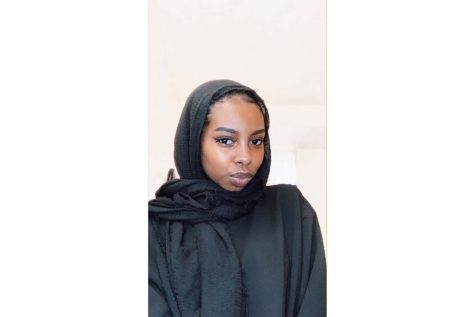
During the protests and discussions with local institutions, Mohamed found it difficult to balance personal grieving with public activism. Mohamed, who said she suffers from severe anxiety and depression, wanted to find a bright spot despite living during a dark time period.
“Through that lens, you have to find some sort of happiness, some sort of peace,” she said. “And we tried to find joy within our movement, when we would sing and when we would dance and when we would protest… but it’s hard, especially as a Black person, knowing that I am a constant target.”
As protest energy died down, Mohamed said the organization has shifted its gaze away from trying to influence the Iowa City City Council and Johnson County Supervisors, and instead focused on the community.
Mohamed herself has taken a step back from the Iowa Freedom Riders, she said, to focus on her last year of college and plan her future. She said in comparing her activism during high school to her activism now, she has been able to find her voice.
She added that her leadership position in IFR taught her a lot about where she wants to go from here, but she felt like it was time to allow others to express themselves through IFR.
“It was a very, very meaningful experience. I loved every moment of it,” she said. “It taught me a lot, and it gave me a lot of information, a lot of knowledge, a lot of things to ponder and look at different ways to look at the world, which I didn’t view before.”
Raneem Hamad: “Anger was all I had.”
Raneem Hamad did not think she would make it out of the protests of summer 2020 alive.
“We really thought our lives were in danger,” she said.
The last time the Iowa Freedom Riders hosted a protest was September 2020.
Hamad, a founder of the Iowa Freedom Riders, attributed the pause in protests to safety, after Gov. Kim Reynolds passed the Back the Blue act on June 17 — laws that provided extra protection for police and more limitations for protesters.
Hamad said as a Black woman in a leadership role, she felt like she had a target on her back. She said she would come home from protests to find police stationed outside her home.
“I’d come home back from the protests and there was just a cop car waiting outside my house,” she recalled. “It just drives away once I start looking at him and taking pictures of the license plate. Cops would follow my car everywhere I drove downtown.”
The fear Hamad felt began long before the first vigil to honor Floyd’s death in May 2020. To this day, she said she still cannot completely watch the horrific video.
She said she and Mohamed were with friends when the news of Floyd’s death broke.
Hamad remembered feeling anger but also numbness, and she asked herself why things like this continued to happen with no consequences.
“I feel like every other emotion I had already felt before, I already went through before,” she said. “Anger was all I had.”
All the anger Hamad and others felt was channeled into the protests and gatherings. However, she said, the creation of the Iowa Freedom Riders was organic.
“It’s beautiful and remarkable and it says something that a lot of the leaders of this movement were primarily Black women, young Black women,” she said. “That in itself says a lot. Black women, we bear the brunt of a lot of the work, the transformational change in our communities.”
Looking back over the last year, she said the biggest shock to her was the disconnect between Black youth and older Black leadership in Iowa City.
She said it was difficult to hear patronizing comments, whether from city council leaders or older Black activists, about the Iowa Freedom Riders’ lack of knowledge when the group’s leaders would suggest changes to local government or police policies.
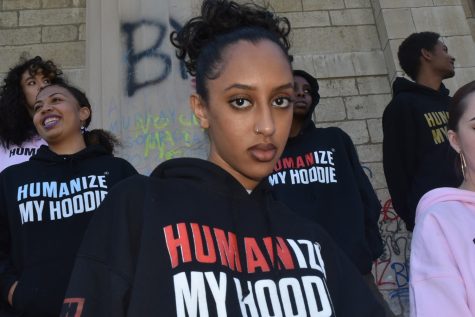
Of the many requests the Iowa Freedom Riders advocated for in their list of demands to the city council, abolition — defunding and dismantling the police system — and diverting resources from the police to local community organizations were two main goals.
“I was consistently dealing with this, like ‘Your ideas aren’t good because you don’t know anything. You don’t know how the government works or how the city works,’” Hamad said. “We’ve lived in Iowa City all our lives, we grew up in this system, we know how sh— happens inside day in and day out.”
One of the most significant challenges she faced, she said, was feeling as though there was a lack of support from Black leadership.
“The sad thing is I started my journey into activism with Royceann Porter,” Hamad said. Porter is a Johnson County Supervisor and founder of the Black Voices Project. “She kind of helped me get into this stuff, and just realizing that, you know, there’s a saying that we have, that ‘Not all skin folk are kinfolk.’ So not every Black person is actually going to be truly, truly for Black causes at all times.”
The Daily Iowan reached out to Porter for comment, but she declined.
Hamad was one of the original supporters of the city’s Ad Hoc Truth and Reconciliation Commission — a commission created to address racial disparities within the city that came out of a 17-point racial justice resolution passed by the city.
Passed in June 2020 after weeks of protest, the resolution was touted as a landmark for the city, outlining its commitment to addressing police disparities and racial inequity in the city.
Eventually, she became a commissioner herself, but Hamad said she is happy she resigned after issues arose between the commission and the council and among the commissioners themselves.
“I tried so hard to get so many community stakeholders to work together to make this something that was transformational in our community,” she said. “It’s kind of sad the leadership in our community doesn’t trust the people of Iowa City that what they want is good for them.”
At the end of all of this, Hamad said what she came to understand is that change is incremental. She said Mohamed’s idea of building power within the people is something she chooses to focus on moving forward.
The existence of the People’s Truth and Reckoning Commission, a community-driven committee created by the Iowa Freedom Riders in April to address racial injustice in response to perceived failures of the city’s Truth and Reconciliation Commission, spoke volumes to Hamad on how the community can come together for support.
“All we would do is just come together in a park and talk about our issues in that moment and brainstorm ideas of how to solve them,” she said. “And somehow, that was doing more and effecting more change in our community.”
The group paused the committee in July, saying in a statement the meetings had veered off from their original goal and “become a place for white people to come and discuss their issues.”
Summer 2020 took a huge emotional toll on Hamad, she said.
“Looking back, would I … put myself through that again?” she said, tearing up. “The answer is yes, I would do it all again. I really love my community … I love fighting for my community and every single Black person in Iowa City deserves a better life than what we have now.”
While Hamad distrusts city institutions to enact bold change, she hasn’t given up on the people.
“I think our people power can do so much, and it has done so much,” she said. “We’ve changed the conversation, we’ve changed the dialogue, and that in itself is powerful.”
She added that she discovered how to know when to step back and focus on what is best for her.
“Learning sometimes to call it quits and put my energy toward other things, and making sure that me, as a Black woman in this world, I am doing OK and I am being successful, whether it’s emotionally, physically, or mentally,” Hamad said. “That in itself is fighting the good fight.”
Mazahir Salih: “I want to work on all the issues”
Mazahir Salih, mayor pro tem of Iowa City, said racial injustice always concerned her not just as a Black community leader, but also as a Black woman. For others, she said, it took the death of George Floyd for them to realize the gravity of the situation.
“I think it’s sad to wait until someone is dying so it will be eye-opening for those who aren’t seeing the issue,” she said. “You know, that’s not OK, but that’s the reality.”
2020 was a hard year, she said, especially for herself and Iowa City Mayor Bruce Teague.
“The mayor and I — the Black individuals on the council — we were grieving during that time,” she said. “But at the same time, we are the policymakers. It would be like, ‘Should we lead the movement, or sit down and make all the policies?’ And sometimes it is tough for us.”
She added that she was glad the council and community were able to come together to create the 17-point resolution.
“That’s not enough to do, but it’s the beginning of a lot of work that needs to be done in Iowa City,” Salih said.
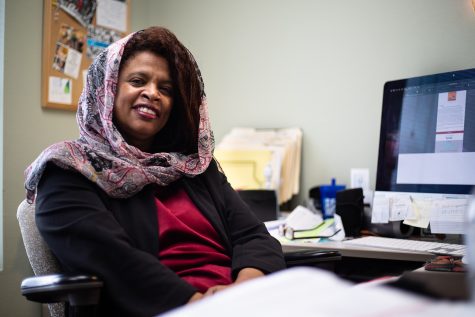
But not all share her same sentiment she said. During council meetings, Salih often spoke up in opposition of her white colleagues’ opinions, and she said many issues are “still looked at through the eyes of white people.”
“Sometimes, as a person of color, I am telling you, ‘This is not the way you do it, this is not the way that is going to make me comfortable,’” she said. “You are solving Black Lives Matter issues, and as a Black woman, you are going to keep telling me, ‘no.’”
She said a phrase that comes from Sudanese culture, “You can’t handle fire the way you handle water,” represents the way white people cannot singlehandedly address the issues people of color people go through.
She said in her three years on the council, she has not seen as many people of color coming to support Black Lives Matter issues as she did during summer 2020. That helped her promote her agenda that she’s had from day one, she said.
Salih advocated for affordable housing for underrepresented individuals and discussing police interaction with Black people well before the 2020 protests, she said. Serving also as the director of the Center for Worker Justice, she talks to many individuals who come to her office to share their stories.
Salih is not seeking another term on the council in the 2021 November election in order to work full time as the executive director of the Center for Worker Justice.
“Every day, I sit down here in this office and cry with people who are really affected by it,” she said. “I see the issues and I know the issues very well. That’s why it’s very dear to my heart.”
Timeline by Molly Milder/The Daily Iowan
David Drustrup: “It’s been an incredibly successful movement.”
David Drustrup, a police abolition activist, called what happened to Floyd “another chapter of the same book.” He said he distinctly remembers hearing protesters marching past his apartment and on a whim, he decided to join them.
Over a year later, he remains one of the Iowa Freedom Riders’ original members and remembers what it was like to march before the group was officially established.
“Those days were exciting, because you don’t feel alone anymore,” Drustrup said. “You feel like there are other people are upset about this for the right reasons, and other people who want to do something about it.”
He said he was put into a unique and beneficial situation by working with Hamad and Mohamed.
Before the protests and joining the Iowa Freedom Riders, he knew about class and race and the way they are intertwined, but the organization introduced him to more radical ideologies.
What makes the Iowa Freedom Riders different from other activist groups is that it is organized as a sociocracy, an idea Drustrip said Mohamed presented which means all leadership is horizontal.
“From an abolitionist perspective, activism and organizing is for everyone,” he said. “Folks who volunteer a little bit of their time here and there are activists, folks who try do something particular with their work or their school towards racial and social justice, that can be considered activism, as well.”
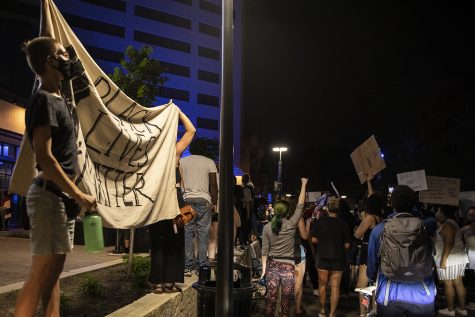
When speaking up about injustices, Drustrup said he believes marginalized voices are ignored because they will enact the most change if their voices are centered. He said historical systems like slavery, Jim Crow, and segregation would have come to an end more quickly if people of color were given a platform to speak.
“That’s why it’s so important for IFR and other radical groups to maintain the intersections of marginalization at the center of our groups and have those voices be the most important,” he said.
Like Hamad and Mohamed, Drustrup said measuring success over the last year shifted from changing the structure of local government to making community connections with other like-minded activists.
He said many individuals came up to the Iowa Freedom Riders organizers telling them that they had never felt more powerful or more heard in their life than during summer 2020.
“People who were never involved in organizer activism at all, are they now feeling like they have a home? Are they feeling like they are seen in a city … that usually does not care for them, because they are queer, or Black or brown, or an immigrant,” he said. “So as long as those things are happening … even if it were to end tomorrow, its been an incredibly successful movement.”
Bruce Teague: “Being engaged with the community is vital”
Mayor Bruce Teague recalled that the second he heard about George Floyd’s death, he joined with three other elected officials and a pastor to create Speak Up, Speak Out, a series of listening sessions in early June, to create a healing space.
“What I appreciated during that time was people coming together and grieving together, sharing their frustrations authentically,” he said. “It was a time that we needed to — even in the midst of COVID — come together and grieve as a nation. Not only as a nation, but especially within our own community.”
Teague said one of the most important things to come out of the Black Lives Matter movement in Iowa City was kickstarting a conversation with the whole community.
“Being engaged with the community is vital,” he said. “Having the conversation to make sure that what we’re doing as a community, we are doing in unison to the best of our ability. We know it’s a hard subject, there’s a lot of facets to it.”
Teague said some of the demands on the 17-point resolution were easy to check off right away, such as the ban on chokeholds and establishing Juneteenth as a city holiday, but some ongoing acts “will always be there,” like the work to restructure the police, which Teague said is still underway.
The city passed a 2.5 percent budget increase as part of its restructuring plan to include two community positions: a full-time Street Outreach and Engagement Specialist, and a part-time Community Outreach Assistant to engage with the city’s immigrant and refugee population.
By August, Teague said, the city had appointed a new Public Safety Informational Specialist and replaced one of the officer positions with a civilian Victim Support Specialist, as part of the council’s priority to introduce more mental health response into the department.
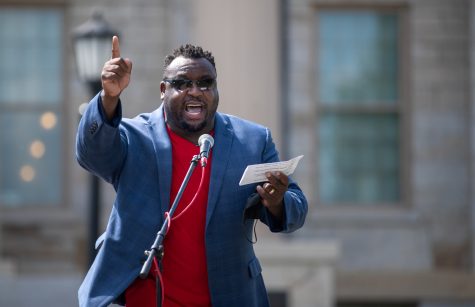
He said making changes within the city’s ordinances and policies takes time, it is important to make intentional changes that will prevail and not just “Band-Aid changes.”
“The most crucial is hearing the voices of people in our community, as well as seeking out some of those voices that are often unheard, don’t seek out, haven’t been historically connected with city government,” Teague said. “And those are typically the ones that, in this instance, are most affected by some of the policies that we’ll be changing.”
He added that over the past year, people have become more knowledgeable about steps the council has to take and red tape to break through before action can be taken, which he believes is why the council cannot move as fast as people would like.
“…People know that their city government wants to hear from them, their city government wants to make real changes,” he said.
During that summer, he said tears were shed and the body felt fatigued. However, he said he is glad that what came out of that summer were discussions at both the local and national level.
“When it comes down to Black Lives Matter, I do believe that we have a council that is dedicated to change,” he said. “Now, there are differences of opinions on various things on this council, but I really believe that the heart of the council and the intent is to really make systemic changes within Black lives.”
Janice Weiner: “It’s still moving forward.”
City Councilor Janice Weiner recalled that a conversation with her daughter helped her recognize the reality of systemic racism before summer 2020 when they lived in Washington, D.C.
“My older daughter spent a lot of time with people of color, and she kept telling me, ‘They’re treated differently, look what the police do’… and that sort of opened my eyes to the issue,” she said. “At first I thought, ‘You’ve got to be kidding, this isn’t right,’ but I saw it happen regularly with my own two eyes.”
Weiner said she did not know anyone who saw what happened in Minneapolis to Floyd and was not moved to act.
She said while the City Council has not achieved everything that the members want to accomplish with Black Lives Matter, the actions of community members and the movement itself put it on the agenda permanently.
“We now see everything through that lens — through the Black Lives Matter lens — when we look at issues, as well,” she said.
She added that this was a particularly stressful time for her, as she and City Councilor Laura Bergus had only been on the council for about six months when protests began. She said as a council, the last time the city had gone through anything like the Black Lives Matter movement was the Vietnam War protests of 1968.
“I would like to think it forced us to be better councilors, because in addition to dealing with the normal zoning and other issues, we had to think bigger and think differently about topics that might not otherwise have come onto our agenda,” she said. “And we were pushed, and we were yelled at, and we were sworn at … it was a result of activism in the wake of the BLM protests, it was a result of people waking up and saying, ‘Hey, this matters to us.’”
She added that the city was changed dramatically because of the Iowa Freedom Riders.
“I don’t think we would be where we are, but for their energy and their passion, and pushing,” she said. “So I may not agree with how they did it, but at the same time, they were instrumental in making sure [BLM matters] got on the agenda and stayed on the agenda, and inserted it into our everyday lives.”
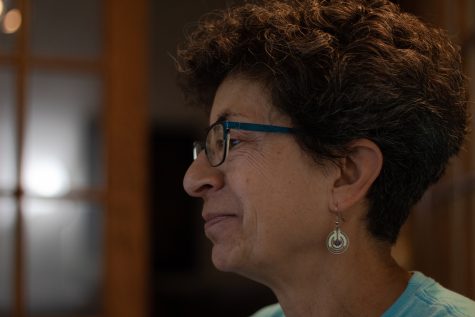
The council members knew they had to join in solidarity with protesters on June 4 after protesters were tear gassed, Weiner said, and observe how different police patrols — the Iowa City Police Department, Johnson County Sheriff, University of Iowa police, and Iowa State Patrol — operate in the Iowa City area.
“Each has their terrain or area for which they are responsible,” she said. “So trying to influence that becomes really complex, because you only have a say over what we have a say over.”
Since summer 2020, the City Council has encountered roadblocks, particularly when reimagining the Community Police Review Board — the first of its kind. One of the demands to make the board more transparent when it comes to specific complaints has been difficult to fulfill because of state laws, including the Back the Blue act.
“It’s a huge challenge when you’re in a place that’s diametrically opposed politically from the trifecta in Des Moines,” Weiner said. “And at the same time, we also have to pay a little bit attention to if we do X, what will the state House do to us? And I don’t think we’ve let that color our view too much, but it’s buried in the back of my mind.”
Weiner said with all the conversations between community members and the city council, she has to remind herself and her fellow councilors of what the ultimate goal is.
“My view is, the goal is to move forward and see everything through this lens and see how we can improve,” she said. “… It’s a challenge to deal with people who are yelling at you, and it’s a challenge dealing with issues when there is more than one BIPOC voice in the community.”
Early on, the council saw individuals coming forward to express their feelings on the movement, from those who have lived in Iowa City for decades to immigrants and young people who are frustrated with the city’s current state.
“We continue to talk to people, and listen and learn and try to do the best we can,” Weiner said. “And it’s not linear, and it’s not perfect, and it’s not as fast as people want it to be, but it’s still moving forward.”
